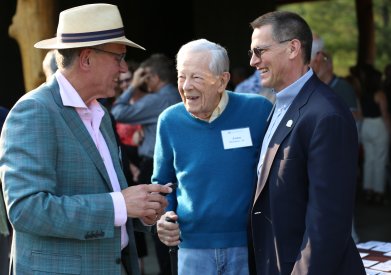One Doc’s Reactions to Choosing Wisely®: An Interview with Dr. Blair Erb
April 17, 2013
Dr. Blair Erb of Bozeman Deaconess Health Group, located in Bozeman, MT, is a Trustee of the American College of Cardiology and sits on the Clinical Quality Committee steering committee. He is board certified in Internal Medicine and in Cardiovascular Disease. His special interests include echocardiography, valvular heart disease and risk factor modification.
Dr. Erb recently shared his thoughts on the Choosing Wisely® campaign:
What was your initial reaction to the campaign?
When I first heard about it, it took a little while to sink in. Politically, there could be a negative response to the campaign because the real conundrum is that we live in a world where physicians are being asked to limit the care they provide in what remains a volume-driven system.
What affect did Choosing Wisely have in your practice?
When Choosing Wisely came out, it simplified my approach in telling folks they don’t need certain things. Before, all I could do was refer patients to our practice guidelines, and those are really unwieldy for a lay population. Referring physicians weren’t reading them either.
Choosing Wisely distilled the guidelines and made them easy to read. Just look up the Choosing Wisely website – it’s all based on data and evidence.
It’s really made the conversations much easier with patients, and referring physicians. When a patient asks for something they don’t need, I can say to them “In keeping with the Choosing Wisely campaign, we will not perform cardiac stress testing.”
I also make sure to cite the Choosing Wisely guidelines in my dictation to referring physicians.
How do your patients react when you tell them they don’t need a test or procedure?
The success of those conversations depends on how you couch them. If I tell them they don’t need something and there’s no evidence it will help them, 99% of patients accept it with no questions asked. They say, “If I don’t need it, I don’t want it.”
But there are still some patients that will say they want it, even if I tell them it provides nothing but false security. But I think that will be a small number of patients.
I’ve been promoting Choosing Wisely for about six to eight months. So far I’ve received no push back from referring doctors, and maybe two patients. It’s just a matter of honest conversation.
Do you think the campaign has been successful so far? Why?
An important part of the campaign is it started the conversation. It’s actually succeeded in starting the conversation at a grass roots level where others have failed. Part of it has to do with the multi-specialty buy-in. It’s not from one set of doctors, or health care stakeholders – it’s from the physicians themselves. That makes it difficult to ignore.
What challenges does the campaign face in meeting its goals?
The number one issue is payment—we have a volume-driven system. Physician reimbursement has been slashed to where it’s difficult to meet overhead. Without addressing that, it’s going to be tough gaining traction with the campaign. The next step is to go to payers and say, ‘The ball is in your court.’
It’s also well noted by the Dartmouth Atlas that different areas in the country develop their own medical ecologies. There are some areas where some tests—like coronary stress tests—aren’t performed regularly, but some areas where they are. There’s huge variability in health care consumption in this country, and it’s a reflection on these medical ecologies. Campaigns like Choosing Wisely have the potential to start leveling out that variation.
How can the campaign continue to grow and make an impact?
What we need to do is continue to push through the specialty societies. They’re going to respond to their own kind. I think continuing to work aggressively with the specialty societies will be critical to success. To get specialty societies involved is a huge step and has given a lot of credence to the campaign.
But at some point you need to ask – what’s the end game? What are we really looking for? I think we’re looking for a way to shift from volume to value. Choosing Wisely may be in a position to do that. You could go to payers and say, you need to work with us if we’re going to affect this change.


